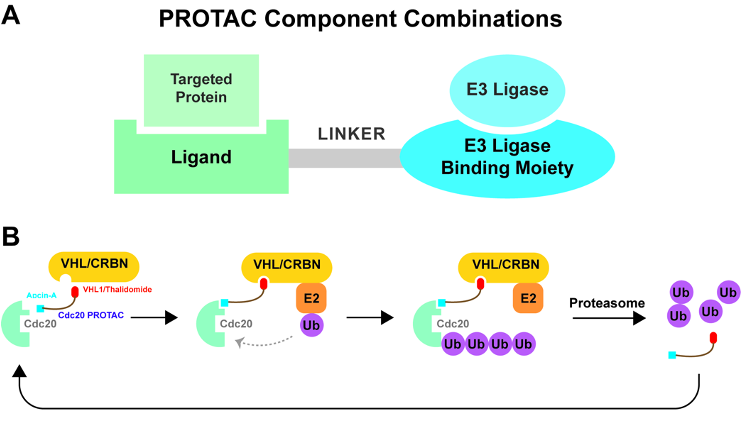A Novel Strategy to Block Mitotic Progression for Target Therapy
NU 2019-008
INVENTORS
Yong Wan*
Zhuan Zhou
Junlong Chi
Gary Schiltz
SHORT DESCRIPTION
A novel proteolysis targeting chimera with high in vivo potency against breast cancer
BACKGROUND
Ubiquitination of a protein results in destruction of the protein and, subsequently, the cell itself. A technology known as the proteolysis targeting chimera (PROTAC) utilizes this natural mitotic blockade pathway by recruiting an endogenous ubiquitin protein ligase to a targeted protein in order to induce protein destruction. Bifunctional PROTAC molecules bind to the targeting protein with one end while the other end binds a ubiquitin ligase to mediate the transfer of ubiquitin. Since PROTACs only need to bind to their targets with high selectivity, as opposed to inhibiting the enzymatic activity of the target protein, previously ineffective small molecule inhibitors can now be retooled as PROTACs. Thus, mitotic blockade of the targeted protein by either enzyme inhibition or protein degradation is an effective therapeutic strategy to suppress tumor progression.
ABSTRACT
Northwestern researchers have developed a novel targeted protein degradation methodology that can specifically degrade cell division cycle protein 20, or Cdc20, a mitotic regulator that has demonstrated a pivotal oncogenic role in tumor progression and drug resistance in recent pathological studies of triple-negative breast cancer (TNBC). TNBC is one of the most aggressive subtypes of breast cancer with a poor prognosis and high rate of recurrence for patients. In spite of this, TNBC lacks a multitude of treatment options, because it does not exhibit the commonly overexpressed receptors targeted by most breast cancer therapies. As an emerging modality to hit previously “undruggable” targets, PROTAC technology holds several advantages compared to small molecule inhibitors, including higher in vivo potency and selectivity, irreversible degradation, and greater resistance from critical gene mutations. In in vitro and in vivo models of TNBC, the researchers observed induced destruction of Cdc20 by their novel compound that led to significant inhibition of cancer cell proliferation. Xenograft model studies in mice demonstrated a 70% decrease in size and weight of the tumor compared to the placebo, with no significant toxicity observed. Additionally, when taxane-resistant cancer cells were treated with a combination of the Cdc20 PROTAC and paclitaxel, a taxane that is a common chemotherapeutic agent for TNBC, the cells displayed a re-sensitization and cytotoxic response to the paclitaxel. This work suggests that targeting Cdc20 for degradation can be an effective therapeutic strategy for anti-mitotic breast cancer therapy or combination therapy for drug resistance.
APPLICATIONS
ADVANTAGES
- Demonstrates greater efficacy and potency for proliferation suppression and death of breast cancer cells compared to small molecule inhibitors
- Overcomes and restores cytotoxic response in taxane-resistant cells
PUBLICATIONS
Chi J, Li H, Zhou Z, Izquierdo-Ferrer J, Xu Y, Wavelet C, Schiltz G, BinZhang B, Cristofanillii M, Lu X, Baharf I and Wan Y (2019) A novel strategy to block mitotic progression for targeted therapy. EBioMedicine 49: 40-54.
IP STATUS
Issued US patent 12,414,995.

(A) Design and (B) mechanism of action of Cdc20 PROTAC.
Patent Information:
| Title |
App Type |
Country |
Serial No. |
Patent No. |
File Date |
Issued Date |
Expire Date |
Categories:
Life Sciences > Therapeutics
Keywords:
Breast cancer
Cancer/Oncology
Small molecule
Therapeutics